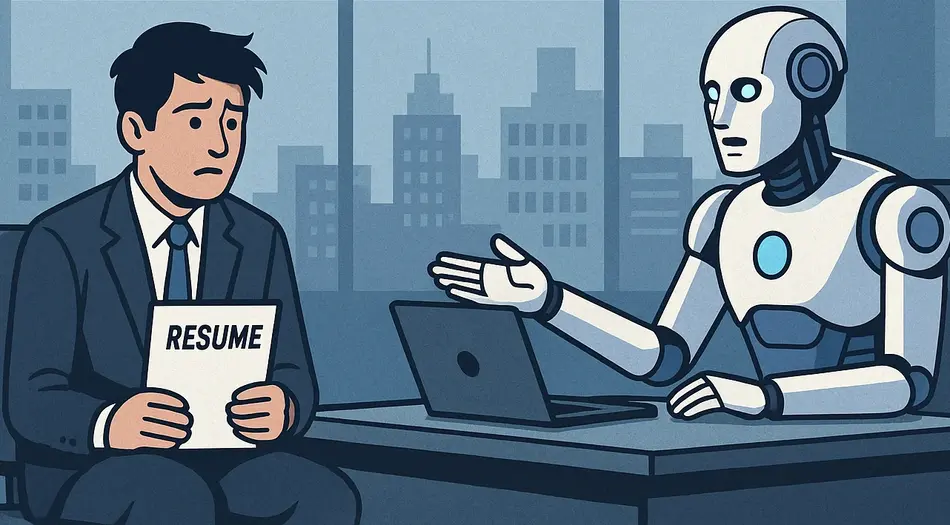The Hidden Collapse of America’s Entry-Level Job Market
The US labor market is showing deeply concerning signs of weakness that should alarm both current job seekers and those planning their career paths. Recent data reveals a troubling trend: full-time employment dropped by a staggering 623,000 jobs in May alone – the fourth largest monthly decline in five years and the second monthly decrease this year. As a result, the share of full-time jobs in the labor force has slipped to 79%, the lowest level since August 2021, continuing a three-year downward trend.
For recent college graduates, this deteriorating labor market presents unprecedented challenges that previous generations never faced. Despite their degrees, internships, and substantial student debt, many find themselves hitting an insurmountable wall in their job search.
Discover strategies for navigating the hidden job market
Table of Contents
The Graduate Employment Crisis: Shocking Statistics
According to the New York Federal Reserve, labor conditions for recent college graduates have “deteriorated noticeably” in recent months. Current data paints a grim picture:
- Unemployment for new graduates now stands at 4.8% – an unusually high level
- Even MBA graduates from top schools struggle to find suitable employment
- Law school applications are surging, echoing the “bunker mentality” of the 2008 financial crisis
- The “recent grad gap” (difference between graduate unemployment and overall unemployment) hit an all-time low last month
This unprecedented situation means today’s college graduates face worse job prospects than the average American worker – something that has never happened before in modern economic history.
Three Key Factors Driving the Labor Market Crisis
What’s causing this alarming shift in employment opportunities for young professionals? Three critical scenarios help explain the current labor market crisis:
1. The Incomplete Recovery: Pandemic Aftershocks
The labor market for young professionals never fully recovered from previous economic shocks. After the 2009 recession’s peak unemployment, recovery was painfully slow. Many companies implemented hiring freezes or downsized, making it especially difficult for inexperienced young people to enter the workforce.
Just as the economy appeared to rebound, the pandemic struck, followed by inflation spikes that prompted the Federal Reserve to raise interest rates. This cooling effect hit white-collar industries particularly hard:
- Tech sector experienced massive layoffs
- Software and IT operations saw plunging job openings
- Software programming job postings for new graduates have dropped over 50% since 2022
For graduates hoping to break into technology, consulting, or finance, the market landscape has fundamentally changed – and not in their favor.
Learn how economic trends affect job security
2. The Devalued Degree: Education’s Diminishing Returns
College education no longer delivers the same competitive advantage in the labor market that it did even a decade ago. Research from the San Francisco Federal Reserve identifies 2010 as a turning point – the year when the lifetime earnings gap between college and high school graduates stopped growing.
Simultaneously, fewer online job listings now require college degrees. While higher education still offers benefits on average, the returns have become less predictable, creating additional pressure for graduates carrying substantial student debt.
Key indicators of this shift include:
- Shrinking college premium (financial advantage of having a degree)
- Rising tuition costs creating riskier educational investments
- Increasing number of employers dropping degree requirements
- Growing skepticism about traditional education’s value proposition
This structural shift benefits non-college workers but creates significant challenges for those who invested heavily in higher education.
Find entry-level positions that match your qualifications
3. The AI Revolution: Technology Eliminating Entry-Level Positions
Perhaps most alarming is how artificial intelligence is quietly transforming the economy at the expense of recent graduates. Entry-level white-collar positions typically involve tasks that AI can now perform efficiently:
- Reading and summarizing information
- Producing reports and presentations
- Analyzing data and identifying patterns
- Creating basic content and communications
These are precisely the responsibilities traditionally assigned to junior staff – tasks that generative AI can now perform virtually at no cost. As companies adopt these technologies, they’re discovering that smaller, tax-saving teams augmented by AI can replace larger junior staff groups.
Industries Most Affected by AI Displacement
The impact of AI on entry-level positions varies across sectors:
- Legal Industry: AI is rapidly taking over paralegal tasks and basic legal research
- Consulting: Teams are using AI to replace entry-level analysts
- Technology: Elite developers leverage AI co-pilots, reducing need for junior coders
- Marketing: Content generation tools are diminishing entry-level creative positions
- Financial Services: Automated analysis tools are replacing junior analysts
This technological shift appears to be shrinking the entry level across multiple industries simultaneously – an unprecedented challenge for new workforce entrants.
Explore AI-resistant career paths
Economic Downturns Accelerate Technological Displacement
Historical patterns show that recessions typically accelerate technological change as companies use economic downturns to shed less efficient workers and double down on productivity through automation. Even if AI isn’t directly replacing jobs yet, high spending on AI infrastructure may be diverting funds away from hiring initiatives.
Some experts remain skeptical about the immediate impact:
- We haven’t yet seen the explosive productivity growth expected from an AI revolution
- According to the New York Fed, most firms report AI having a “negligible effect” on hiring so far
- LinkedIn’s chief economist hasn’t observed evidence of large-scale job loss directly attributable to AI
However, many companies are adopting cautious approaches, cutting costs on operational expenditures through layoffs while focusing on short-term margins to please shareholders. This creates a perfect storm: businesses reluctant to invest in entry-level talent while simultaneously diverting resources toward AI implementation.
Hiring?
Connect With Talented Graduates During the Labor Market Crisis
Despite challenging economic conditions, hiring top graduate talent now offers unique advantages. Gain early access to motivated professionals with fresh perspectives and cutting-edge skills — before your competitors do.
🎓 Post Jobs for Free with WhatJobsWarning Signs for Young Professionals
Whether stemming from lingering recession effects, structural shifts in education value, or early-stage AI transformation, the job market for young graduates clearly displays warning signals:
- Declining full-time employment opportunities
- Growing gap between graduate expectations and market realities
- Increasing competition for fewer entry-level positions
- Rising requirements for experience in “entry-level” roles
- Extended job search timelines and multiple application rejections
These indicators point toward a significant economic slowdown ahead, with young professionals likely bearing the brunt of the adjustment.
Discover strategies for standing out in a competitive job market
Protecting Your Career in an AI-Transformed Economy
Despite these challenges, proactive strategies can help recent graduates navigate this difficult landscape:
1. Develop AI-Complementary Skills
Rather than competing directly with AI, focus on developing skills that complement automation:
- Creative problem-solving and critical thinking
- Emotional intelligence and interpersonal communication
- Ethical decision-making and judgment
- Cross-cultural competence and collaboration
- Technical skills that involve AI implementation
2. Pursue Experience Through Alternative Pathways
With traditional entry points disappearing, consider alternative routes to gain experience:
- Freelance and contract opportunities
- Project-based work through platforms like Upwork
- Volunteer positions with professional organizations
- Self-initiated projects demonstrating relevant skills
- Internships and apprenticeships, even post-graduation
3. Target Growth Sectors Less Affected by AI
Some industries continue showing strong demand despite overall market contraction:
- Healthcare and medical services
- Renewable energy and sustainability
- Cybersecurity and data protection
- Education and training
- Infrastructure development
4. Build Multiple Income Streams
Diversifying income sources provides financial stability during uncertain times:
- Combine part-time positions to create full-time equivalent work
- Develop side hustles related to your primary career path
- Monetize skills through online platforms and marketplaces
- Consider remote work opportunities beyond your geographic area
Find flexible work arrangements on WhatJobs
Need Career Advice?
Navigate the Graduate Labor Market Crisis with Expert Guidance
Struggling to launch your career in today’s challenging job market? Get personalized advice on developing AI-resistant skills, finding hidden opportunities, and positioning yourself for success despite economic headwinds.
💡 Visit Career AdviceFAQ: Understanding the Labor Market Crisis for Graduates
What is causing the current labor market crisis for recent graduates?
The labor market crisis for recent graduates stems from three main factors: incomplete recovery from previous economic downturns, diminishing returns on college education, and AI technology eliminating traditional entry-level positions. Full-time employment dropped by 623,000 jobs in May alone, with the share of full-time jobs reaching its lowest level since 2021, creating unprecedented challenges for new workforce entrants.
How is artificial intelligence specifically impacting entry-level job opportunities?
Artificial intelligence is transforming the labor market crisis by automating tasks traditionally assigned to entry-level workers, such as information summarization, report production, data analysis, and basic content creation. This technological shift affects multiple industries simultaneously, with legal, consulting, technology, marketing, and financial services seeing significant reductions in junior positions as AI tools perform these functions at minimal cost.
Which industries offer the best prospects for graduates during this labor market crisis?
Despite the overall labor market crisis, several sectors continue showing strong demand for graduates: healthcare and medical services, renewable energy and sustainability, cybersecurity and data protection, education and training, and infrastructure development. These fields either require human skills that AI cannot easily replicate or are experiencing growth that outpaces technological displacement.
What strategies can help graduates navigate the current labor market crisis successfully?
To navigate the labor market crisis successfully, graduates should develop AI-complementary skills like creative problem-solving and emotional intelligence, pursue experience through alternative pathways such as freelancing and project-based work, target growth sectors less affected by automation, and build multiple income streams for financial stability. Additionally, networking aggressively and demonstrating adaptability to employers can create opportunities despite market challenges.




